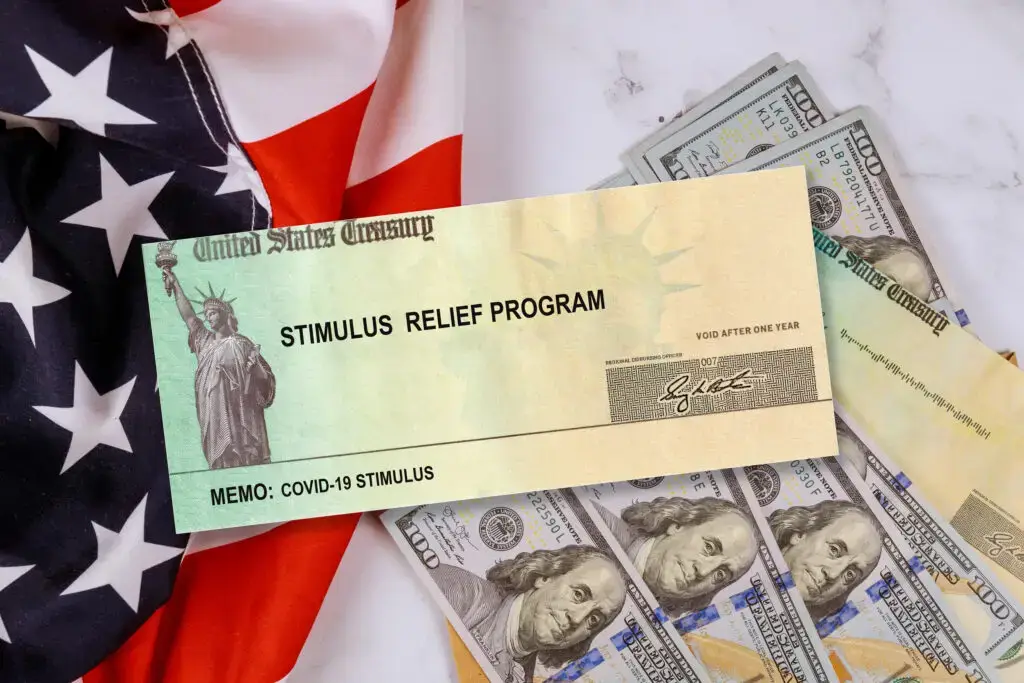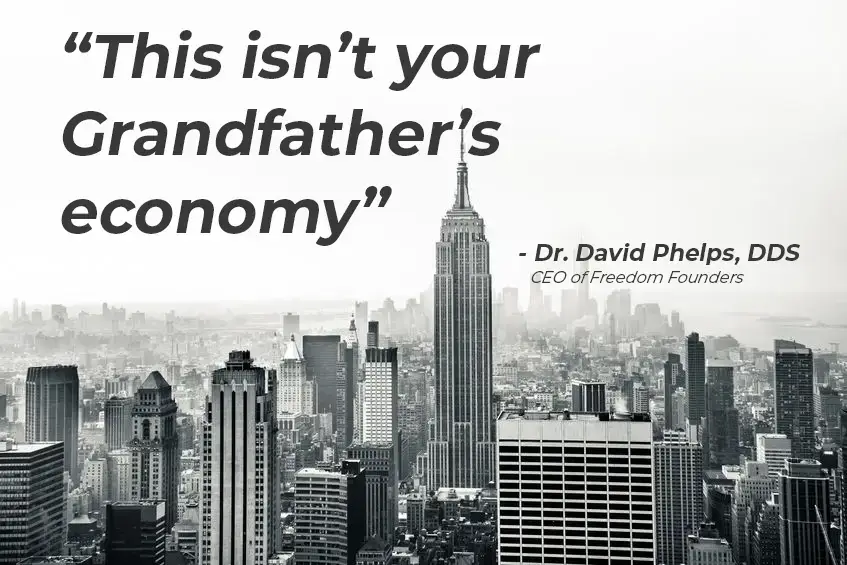
The past two years have been a period like no other in our lifetime. The coronavirus pandemic upset a strong economy and a bull run market eight years in the running. Now rising inflation and global unrest are threatening to destabilize an already vulnerable economic system.
Everything you thought was a logical, guaranteed outcome, whatever you think is stable – isn’t.
The markets are obviously in severe gyrations. There are new opportunities as well as clear dangers. Knowing how to thread the needle will be the difference maker. Sitting on the sidelines will be the worst option. Nobody can afford to. Not with inflation rates with massive debt and deficit spending at all time highs. Ukraine/Russia is the wild card.
Over the last few years, the government has rolled out the most significant fiscal stimulation in history, dwarfing the government interventions of the Great Depression and the Great Recession of 2008.
Today, practitioners are faced with hiring and staffing challenges, rising inflation that threatens to squeeze margins, a host of new tax proposals targeting high income earners, and the increasing commoditization of dentistry (through corporatization, as well as through government initiatives such as medicare).
What does all of this mean for you, the practitioner? What does the future hold? Are you prepared to adapt?
The Calm Before the Storm – A Slow Motion Crash?
Bolstered by massive government stimulus, the economy appeared to be rebounding from the COVID recession, but there is much unseen below the waterline. The massive federal stimulus (CARES Act) only temporarily forestalled the real effects of the shutdown – kicking the can down the road.
A nation cannot print or borrow their way to wealth. There will be a day of reckoning. Perhaps soon. In fact, the rules of the game are already changing.
The business and investment model you have used to date will not be the model to take you to your financial freedom goals.
How will this uncertainty affect your future? How do you go forward and avoid subsequent personal or business disruption? Do you have a plan that incorporates flexibility into a volatile environment?
Threats to Your Personal Freedom and Autonomy:
- Stock market bubble. The market began the year at a very precarious decade-long high. The old adage “as goes January, so goes the year” has proven to be an ominous harbinger for the year. What goes up will come down and ever so quickly. Do you have another ten years to play catch-up if faced with a correction decimating 35-50% of your wealth portfolio?
- Government regulation and interference. Politicians have become emboldened by their authority, power, and ability to curtail commerce and jeopardize livelihoods at will during the coronavirus pandemic. There could be a future in the healthcare industry with mandatory quotas of Medicare and Medicaid patient acceptance by all licensed doctors. Are you prepared for such a mandate?
- Higher taxation (confiscation and redistribution). The national debt has exploded ($30 Trillion is an unfathomable number). Taxes will go up for the producers (entrepreneurs and business owners). The Biden tax plan proposes onerous restrictions on qualified retirement accounts, eliminates the long-term capital gains tax rate and increases the corporate tax rate. Several states have already added a wealth tax on unrealized gains (which would require taxpayers to have their assets appraised annually and pay tax even on unrealized net increases in their value). The bottom line: you could find yourself paying taxes on gains without actually receiving any monetary proceeds.
- Employee “rights” (benefits). Politicians need votes to retain control. It is easy to promise “a chicken in every pot” or “a car in every driveway” to buy votes. We have recently witnessed significant expansions of employee benefits becoming employer requirements, not suggestions. What will this do to your already reduced profit margins?
- Decreasing insurance reimbursements (pricing commoditization). Emboldened by the virus shutdown, insurance companies both delayed payments due to providers and actively reduced reimbursement schedules citing employers’ need to reduce employee health benefits. It’s a race to the bottom. How low can you go and remain viable?
- Growth of corporate DSO’s (industry consolidation). High student loan debt and insurance domination have allowed the proliferation of corporate dental chains that can leverage size and negotiate with insurance plans, suppliers, and manufacturers. As a solo practice, how will you continue to compete in this environment?
- Inflation (the hidden tax). The federal debt expansion comes with a high price tag. Raising taxes will only provide a drop in the bucket of debt relief. The only politically viable way for a government to offset sovereign debt is through the currency’s devaluation, which can lead to hyperinflation. The increased cost of living is particularly devastating to retirees who are no longer in an active income-producing mode. Many are too young to remember the “stagflation” of the 1970s. Stagflation is a scenario in which high inflation couples with an anemic economy. Our country experienced this devastating combination between 1965-1982… Will we see this challenging scenario again?
The Great Wealth Transfer – Victim or Opportunist? (Which side will you be on?)
Recessions are disastrous to the majority. Both income and wealth are lost through credit contraction, business failures, and decreased asset values due to a lack of liquidity. On the other side, those who maintain stable cash flow and profit margins position themselves to be able to buy assets (businesses and real estate) at deep discounts. Wealth is never lost; it only changes hands. What will be your position?
The Vulnerability of Having Only One Primary Income Source.
2020 taught many of us the painful vulnerability of relying on our active “work” as our primary income source. Active income is not only vulnerable to global pandemics. Dependence on active income can leave you vulnerable to the disruption of injury, personal health issues, local disasters, and other unforeseen “Black Swans.” (For me, it was my daughter’s Leukemia diagnosis and subsequent battle with the disease that made me realize this vulnerability).).
Bottom line, if you don’t have a financial “Plan B,” you are becoming increasingly vulnerable to circumstances you may not be able to control.
Old Investing Models Will Never Create Freedom.
Old habits die hard. Change is difficult. Staying the course is the default mode.

The Wall Street standard planning model is based on tax-deferral through third-party managed 401(k)s, defined benefits, and cash balance plans invested in the stock market. This model removes the ability of the business owner to have any control over these funds and, worse, prevents their access to the capital until age 59.5. Plans like these are an abdication of one’s financial future. It’s a risk that has been accepted by the majority simply because it is the way it has always been.
The traditional financial planning model is broken, but what then is the alternative?
Do You Have a Plan B?
The best Plan B is creating multiple streams of passive income—recurring revenue, NOT dependent on your primary work or practice.
The Freedom Founder’s community focuses on creating additional income streams that can fully replace active income production. When members reach this point, we call it being “Free for Life™”). Our members begin with a 7-Figure Blueprint Day™ led by me and my wife, Kandace (who is brilliant in finance and investing). The blueprint sets the plan for creating real financial freedom in a defined period.
We use highly-curated real estate investments as the vehicle to create recurring passive revenue streams. Our members build investment portfolios that can generate enough passive revenue to reach their Freedom Number™ (their monthly or annual lifestyle expense rate). They can achieve this milestone within three to five years and often within twelve to eighteen months.
Real estate investment creates sustainable cash flow with tax mitigation and an inflation hedge. No other investment asset class provides this combination of benefits.
Why doesn’t the traditional financial advisor community recommend real estate or alternative investments as an investment vehicle?
- Financial planners don’t make money (fees or commissions) from real estate.
- Financial planners don’t understand the benefits of real estate.
- Real estate is an inefficient market which means that accessing deals and making sales are not as scalable as selling Wall Street products.
- Wall Street is a major marketing engine that has indoctrinated the majority into thinking that financial products are the means to economic independence.
Maintaining Freedom and Autonomy in the Decade Ahead
The dependence on a single income model (Plan A) is rife with danger in a volatile economy. Traditional financial and retirement planning (401(k) and stock market index investing) is an abdication of financial responsibility, and the results are frustration and desperation by those who fail to change course.
The choices that you make today will forever affect your autonomy and that of your family and future generations.
Choose wisely.



